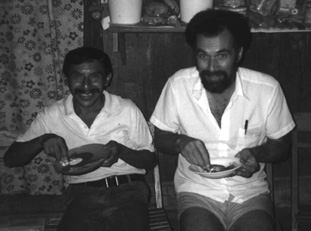 |
FMLN Vets Return to Poverty After the WarBy John PooleIn February I returned to El Salvador for the sixth time since 1989. Conditions on the surface have improved somewhat. There are more material resources available to some people - various stores and businesses providing access to current clothing, furniture, and food. But once the surface is penetrated, there's more to the story. Since the FMLN has become a legitimate political party with significant representation in the Legislative Assembly, as well as in mayors' offices around the country (including the capital), the party membership has softened its denouncement of official government proceedings and begun to splinter into factions. Some of their ex-combatants are among those hardest hit by the recent changes. I visited Perquin, a small rural town in the mountains of northern Morazan (an FMLN stronghold during the war), that is home to the Museum of the Revolution. The town lost the mayoral race last year when the mayor went with one of the FMLN splinter groups. ARENA, the right-wing power in El Salvador, stole the election with heavy bribery and "voters" from other towns brought in by trucks.
Their serious problems seem to be concentrated in two areas. They have difficulty with being in touch with and expressing feelings that were suppressed during the war years. They were able to share their war experiences with me for a few hours in a special meeting, but the people who are close to them are concerned about what has been happening in their current lives. Some have abandoned families since the end of the war. Some want to forget all about the war. While they have worked their coffee plants and soil to the point of becoming certified as organic growers, they lack the resources to get enough money out of the processing dimension of coffee production. They need a machine to remove the shells from the coffee beans. It may be a matter of only US$1,500 to buy the machine. If that turns out to be accurate, I'll be asking for more donations. So far, I have $500 pledged for the purchase. I imagine anyone reading this article can identify rather strongly with what these veterans have experienced and are experiencing now. My hope is that we can develop an ongoing relationship - one that can address both the emotional and the financial problems that they face. Remember our brother and sister veterans in the struggle! John Poole served in Vietnam from 1968-1969 in Chu Lai, near Da Nang, as a supply sergeant for HQ Co. of 123rd Aviation Bde. of Americal Division. He's been traveling to Central America and active in Central American issues since 1984.
|


 The ex-combatants who have settled in the area formed a coffee-growing cooperative with 35 families. The cooperative is named Diaz de Enero (Tenth of January) after the date of the signing of the 1992 Peace Accords. They grow the coffee in common and have small plots on which they grow the food that they need for survival.
The ex-combatants who have settled in the area formed a coffee-growing cooperative with 35 families. The cooperative is named Diaz de Enero (Tenth of January) after the date of the signing of the 1992 Peace Accords. They grow the coffee in common and have small plots on which they grow the food that they need for survival.